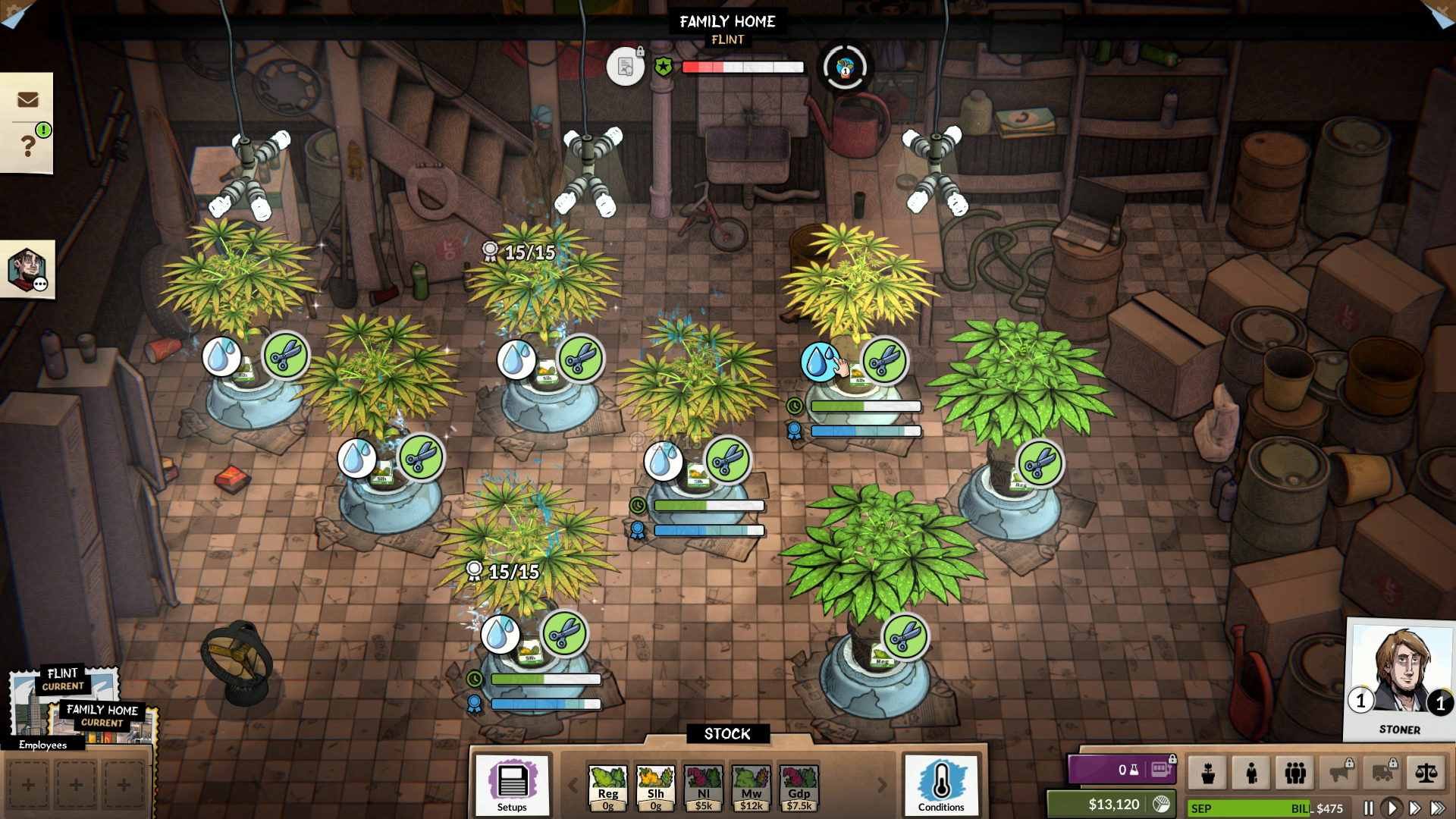Our Verdict
Weedcraft, Inc is a tricky tycoon game that overextends itself—but almost nails it.
PC Gamer's got your back
What is it? Legal/illegal weed growing business management sim.
Reviewed on: Windows 10, i5 4690k, 16GB RAM, Nvidia GTX 970
Price: $20
Release date: Out now
Publisher: Devolver Digital
Developer: Vile Monarch
Link: WeedcraftGame.com
It's always a bad day when the cops come knocking at the door of your illegal marijuana growhouse. The officer, a florid beat cop named Polanski, delivers a friendly warning: The whole building stinks like three dead skunks bouncing around a tumble dryer, and he suggests—wink wink—that I may have a gas leak or something. The next day, I install an air purifier and run it next to the half-dozen tall, budding bushes of Super Lemon Haze.
Weedcraft Inc is a colorful, risque take on the business tycoon idea. In the starting scenario, I play as an MBA dropout who heads home from college and seizes an opportunity to go into the weed business. That could also be the start of a middling stoner comedy, but the game isn't half-baked: it's a detailed management sim crammed full of options and information, and the process of growing and perfecting different plants is satisfying.
Weedcraft does stumble, especially when it tries to cram a lot of details into managing relationships and people, but overall it's a successful pot growing game.
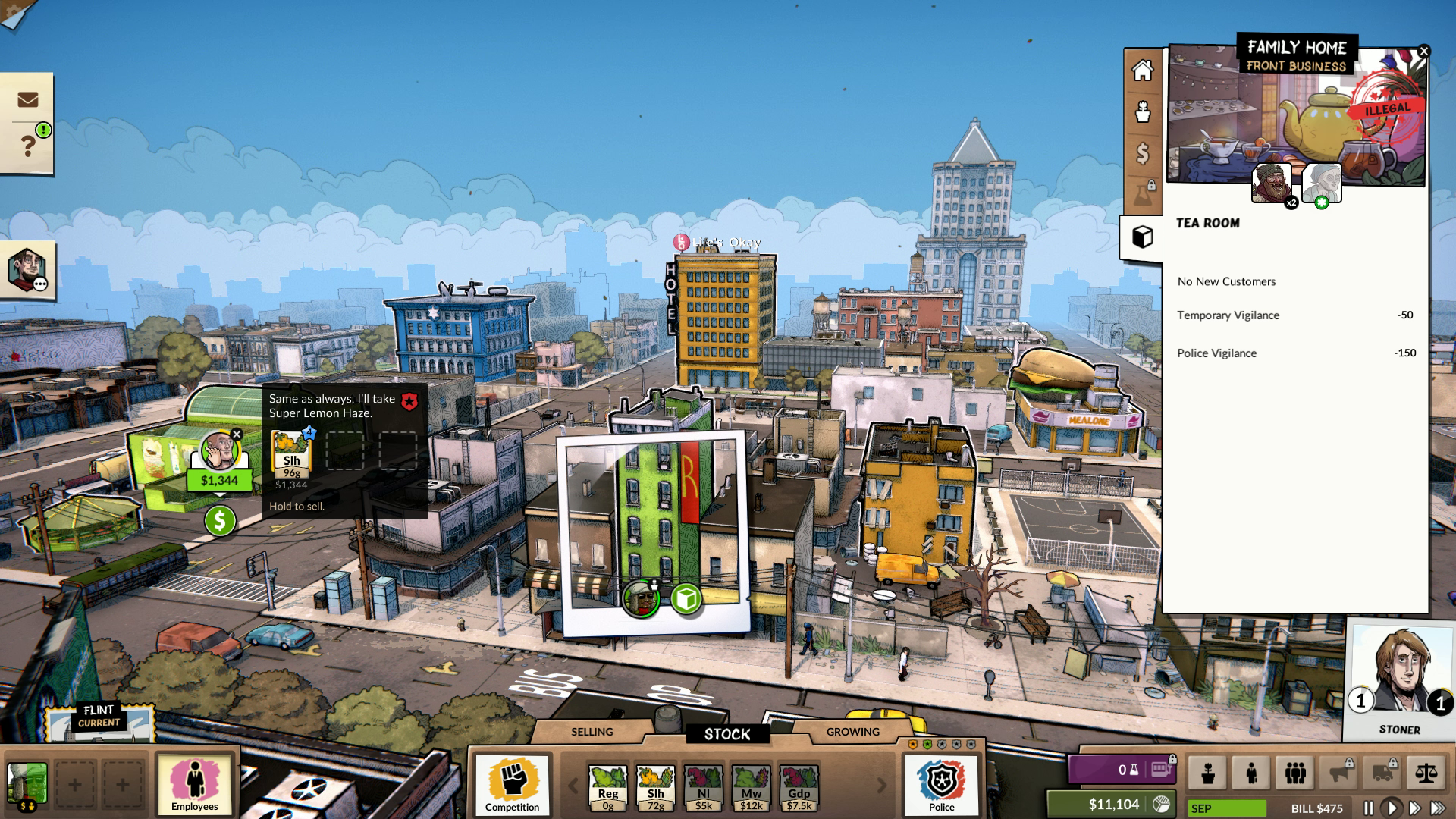
Growing money
Weed is the star of the show here, and it shows up in all its bewildering shapes and flavors. With a little start-up cash, I pay to unlock new strains of marijuana with names like Northern Lights, Granddaddy Purple, and Space Queen. Each has its own flavors and effects that make it popular with different social groups. Cash-flush tourists looking for a good time like relaxing with Margharita Bliss. Epilepsy patients swear by True OG, while cancer patients are all about Blue Dream because it helps them sleep. Different parts of town are frequented by different groups, and everyone has different expectations for price and quality.
My inclination ran toward the high-end market: as soon as I had a chance, I tried to grow the most chemically-pure weed the world had ever seen and charge rich kids and tourists a bundle to smoke it.
This basic process is where Weedcraft is at its best. From the map screen, I see a view of town with a few major landmarks highlighted as possible venues to grow or sell. Each building is populated by different social groups and controlled by different dealers. I look around and I see that competition is weak at the downtown hotel. Tourists there rate the weed available from a local biker gang as sub-par, and I want a cut of their fat, middle-class vacation funds. I spend $10,000 to unlock Margharita Bliss, set up a new grow operation, and get started.
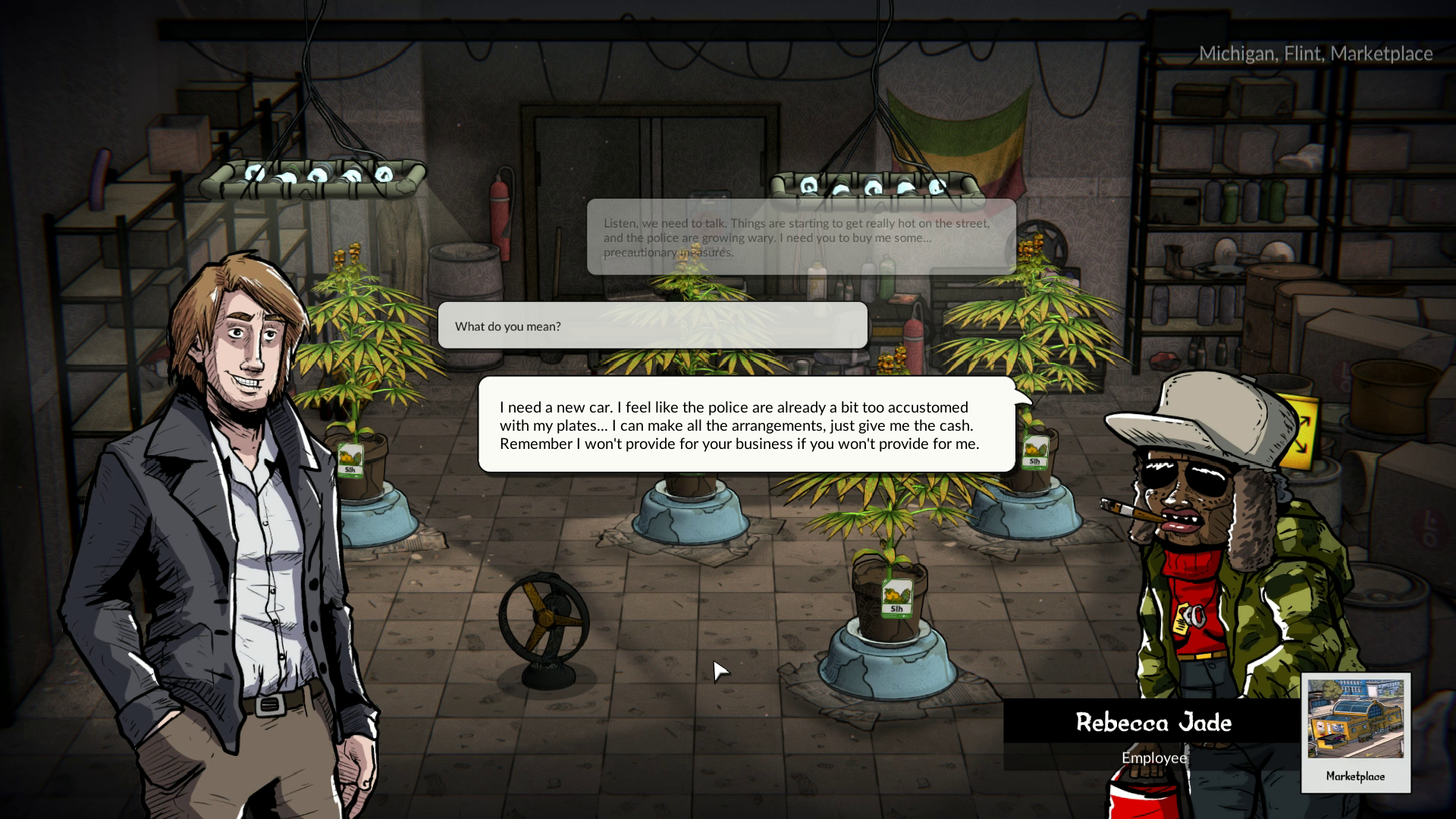
Growing weed starts simple, but doesn't stay simple. I click once to water a plant, which sets a recharge timer spinning until it's due for the next watering. Meanwhile, I can press and hold a plant to "train it," which makes it mature a bit faster. Mechanically, that's all there is to it at first.
The interesting part is trying to boost the quality of my weed. Every time I water the plants, I'm pouring on a combination of nutrients that I can tweak. Finding the right balance of nitrogen, phosphorus, and potassium leads to happier plants. Temperature and humidity in the grow room also have an effect. Between waterings, I use sliders in the grow room menus to tweak a nutrient or bump the temperature, then see what happens, using trial and error to find the optimum growing conditions. Eventually, the hotel's patrons are paying exorbitant prices to smoke my 'rare' or 'epic' quality weed on their vacations.
Spotting a market niche, setting up a new grow, and experimenting to improve quality is immensely satisfying. Watching money pour in to make my expense and risk worth it is my favorite part of Weedcraft.
After I perfect a new strain, though, there's nothing to do but click on timers. This is where the game moves on to hiring employees and building an empire, and it isn't as successful.
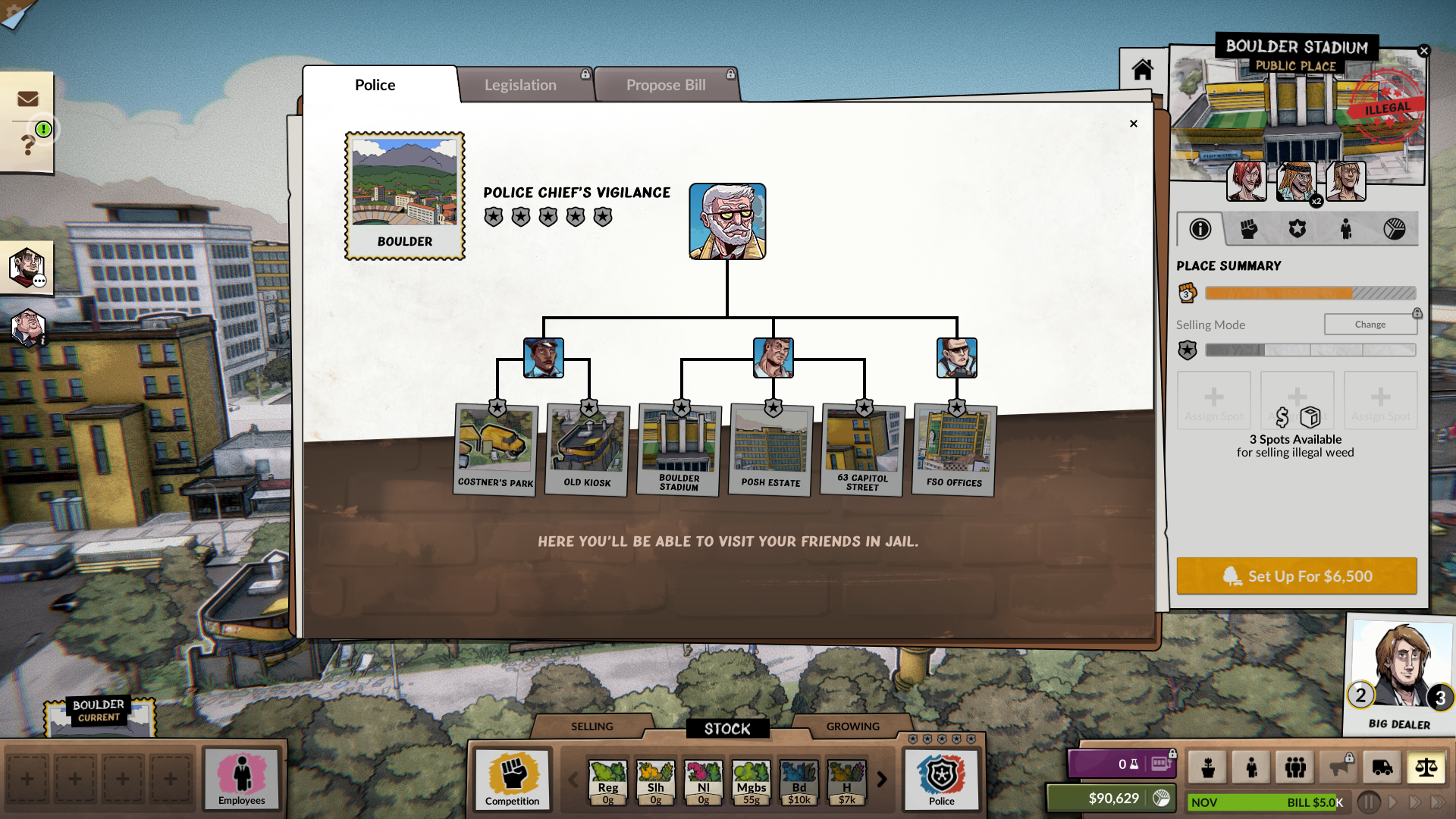
Making friends
The 'manual' labor in Weedcraft, like growing or selling or running a money-laundering front business, involves clicking or clicking-and-holding on buttons to reset timers. Clicking timers isn't very interesting or very fun, and I can only be in one place at a time. Fortunately, there's a long list of locals I can hire to click on those timers for me. In fact, my drug empire was at its most profitable when I had nothing to do. I had dealers that I trusted, I had a grower who cultivated good quality weed, and I just let the money roll in.
I ended up striking a balance: I personally ran a lab where I experimented with new strains and hired people to do everything else.
Every time employees do their jobs, they get a little better at them. When they level up, they get more efficient at their work—and they stop by to ask about a raise. Talking to people and keeping them happy and well-paid is important to this aspect of Weedcraft, but I found the RPG-ish conversation trees repetitive. Since just taking the time to explore conversation trees such as "Family" or "Business" led to a happy friendship, I never met anyone in the game that I just didn't get along with. Eventually, I started treating "make friends" as one more item on my to-do list, speed-clicking through conversation menus to butter up cops and new employees.
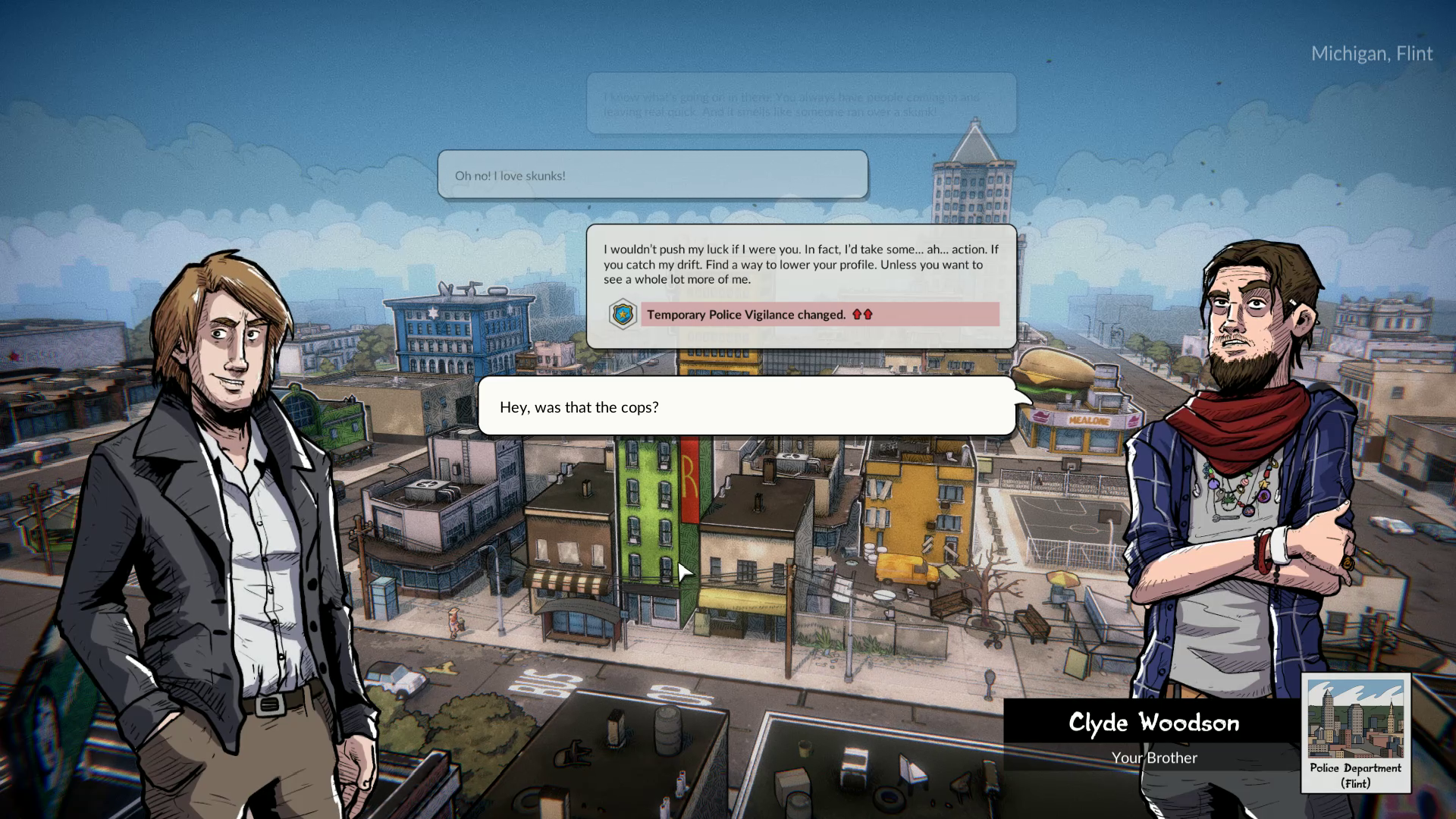
Having great relationships also didn't stop weird betrayals from happening. When Officer Polanski (a close friend of mine) arrested one of my dealers, I paid Polanski a bribe and gave the dealer a raise. The dealer (also a close friend) became fanatically devoted to me until a week later, when a rival gang offered him a little more money and he asked me to match it or he was going to walk. While it's true that poaching employees and matching rival offers is a totally normal thing to happen, it left me wondering: why did I bother making friends with that guy?
These random events make managing human relations feel a bit like a treadmill. Whether or not I keep my employees happy, whether or not I keep the local cops in my pocket, the game's internal logic doesn't seem to care.
These character backgrounds also establish another way to deal with competing drug producers. I routinely sent devoted employees to sabotage the competition or steal a new breed of plant. Pulling off a mission like this is enjoyable and feels kind of like cheating—like sending a ninja to assassinate a rival king in a military strategy game.
But sometimes, it just doesn't work. Once, I investigated dozens of leads on a rival dealer to find that none of them were part of a secret I could blackmail them with. It's true that in real life that some people aren't on the run from a dark past, but I felt robbed. I'm still not sure if it was a bug or a nod to the squeaky-clean nature of some saint-like drug dealers, but it was deflating either way.
When investigations don't pan out or random encounters with employees or cops illogically derail a lot of hard work, Weedcraft is at its weakest: overstuffed, full of options, and with too many superfluous things going on.
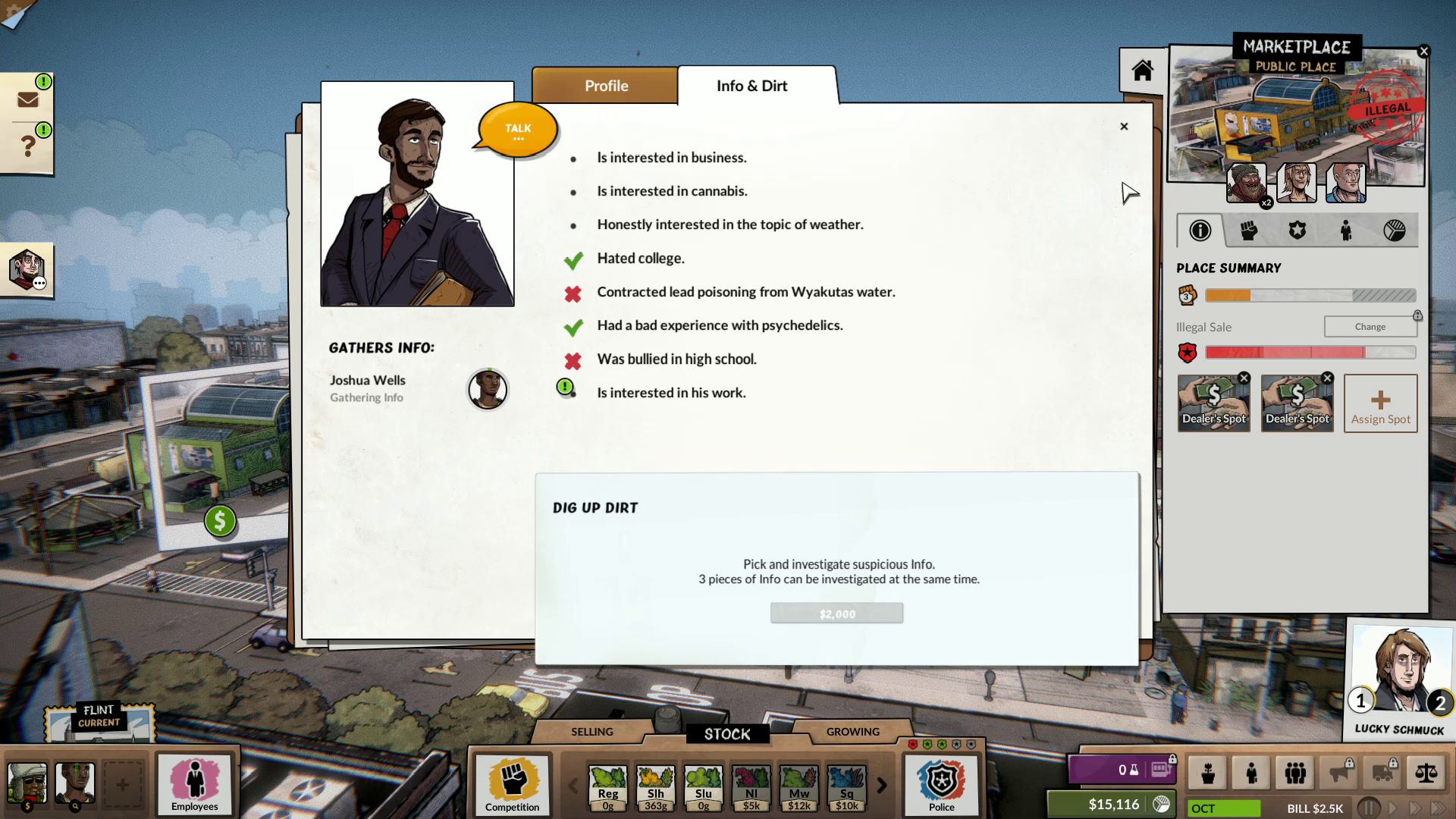
Breaking bad
I delivered weed to a pro-drug war politician whose son was fighting off withdrawal.
Weedcraft promises to "treat weed in an insightful manner," and for the most part I think it nails the politics. The breadth of characters is an accurate portrayal of who smokes weed in America: college students, parents, musicians, artists, professionals, politicians, tourists, patients. My first employee was a grumpy, elderly black woman and my best dealer was a round-faced white man who dressed like a lawyer. Special orders came in from widows suffering from back pain and from pledge leaders at a local sorority stocking up for a party.
I delivered weed to a pro-drug war politician whose son was fighting off withdrawal. I had long conversations about the inherent corruption of a system that celebrates alcohol, condemns marijuana, and turns a blind eye to pharmaceutical companies addicting and killing a generation of pain patients.
All of this is part of a complex background of interlocking legalities. As I expanded to new cities away from the starter city in Michigan, I had an opportunity to sell weed in jurisdictions where it is legal for recreational use. As I grew in wealth and influence, I started helping to craft legislation and propose bills that would legalize or decriminalize marijuana, suddenly seizing the chance to bring my underground business above-board.
Playing with this combination of legal and illegal makes Weedcraft unique in the business-sim genre, as far as I know. Expanding to Boulder, Colorado, I could run a completely legal business. Or I could legally grow in Boulder and then smuggle weed to other cities and sell it illegally. Or I could get a medical grower's license and sell legally to patients and illegally to weekend party-goers. Each jurisdiction comes with its own costs and opportunities, and Weedcraft does a pretty good job of balancing all of these individual pieces.
Weed in America is a complex blend of weird jurisdictions, Reefer Madness–fueled paranoia, and unjust, racially-targeted legal consequences. Even when it doesn't work very well, I'm impressed that Weedcraft attempted to build a tycoon game with enough depth and nuance to explore some of those things.
Weedcraft, Inc is a tricky tycoon game that overextends itself—but almost nails it.
